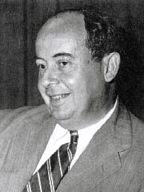von Neumann, John (1903–1957)
John von Neumann was a Hungarian-American mathematician who made important contributions to set theory, computer science, economics, and quantum mechanics. John von Neumann (pronounced von noi-man) received a PhD in mathematics from the University of Budapest and later he worked at the Institute for Advanced Study in Princeton. The book Games and Economic Behavior,1 which he co-authored with Oskar Morgenstern in 1944, is considered a seminal work in the field of game theory. Von Neumann devised the so-called von Neumann architecture used in all modern computers and studied cellular automata in order to construct the first examples of self-replicating automata, now known as von Neumann machines. Von Neumann had a mind of great ingenuity, nearly total recall of what he'd learned, immense arrogance, and a great love of jokes and humor.
 |
References
1. Neumann, J. von and Morgenstern, O. Theory of Games and Economic
Behavior. New York: Wiley, 1964.
2. Poundstone, William. Prisoner's Dilemma: John Von Neumann, Game
Theory and the Puzzle of the Bomb. New York: Anchor, reprinted
1993.


